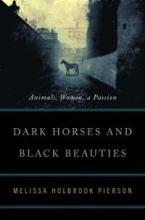
The poor horse. Not only have we abused his stoic power and gravely misunderstood his gentle spirit,but even those writers who revere him have all too often failed him by churning out syrupy, superficial accounts of the bond between a girl and her horse. Yet in Dark Horses and Black Beauties, Melissa Holbrook Pierson boldly grabs hold of a threadbare theme and elevates the hackneyed girl-horse relationship with sobering observations and exploratory ponderings. Throughout her literary wanderings, Pierson dabbles in equine-filled memoir, history, philosophy, and sociology and, as a result, ultimately exposes the current state of humanity.
At the core of Dark Horses is the age-old question:Why do little girls love horses? At first you’ll appreciate Pierson’s eloquent writing, finding it clean, direct, and unpretentious. But as you read further, you’ll quickly realize there’s something larger going on here than simply a nice turn of phrase. Her tempered passion for the welfare of a species other than her own speaks to those of us who are similarly haunted by the plight of the voiceless.Indeed,her moral musings effect an indelible impression and startle likeminded readers with what she herself so accurately calls “the punch of identification.”Those desperate for compassionate company will find a comfortable kinship with Pierson, who doesn’t so much call forth dormant feelings in us,but rather pulls off the rare feat of articulating what we knew all along about ourselves but were unable to put into words.
“So it is first the way they look, both to us and at us, that pins us flat,” Pierson says of horses, recalling what transpires in little girls upon falling in love with these beautiful beasts.While this brilliantly unstructured collection is largely autobiographical, Pierson does pull from credible outside literary sources to bolster the evidence of her findings. And though she is seemingly tolerant of sentimentality in others who have taken pen to paper on the same subject, she rarely allows it to pervade her own writing.
Nor does she condescend with moral righteousness.She is still the awestruck little girl, hopelessly in love with the mystical and glorious horse,yet now she is saddled with the inescapable empathy that adult eyes have forced upon her. She didn’t ask to be this way. She just is. As a woman of good conscience, Pierson clearly grapples with her place in the traditional horse lover’s world and in society at large.“Is there any place for the likes of me?”she wonders. Her enduring compassion makes her admirable and her subtle, often self-deprecating humor makes her likeable.
Both the title and its implied intended audience are misleading. One need not be a “horse person” or a woman to appreciate Pierson’s work here. Despite the fact that women are indisputably drawn to horses more than men are, she points out that “those who love them enough to save them, and be saved by them, are not restricted by gender, but only by the state of their souls.” Furthermore, while Pierson’s main focus is the beloved horse,her deferential concern clearly extends to allcreatures.
Judging from the unimposing tone of her writing,one gets the sense that Pierson did not set out to become an important voice in some ethical crusade.Yet with the venerable horse as her instrument, some may argue she has accomplished just that. With this confessional dissertation of sorts, Pierson explains herself to us, thereby explaining us to ourselves.
Published by W. W. Norton & Company.
For the Best that Pet Lifestyle and Animal Welfare has to offer follow Wendy Diamond on Facebook, Twitter, and right here at AnimalFair.com!
